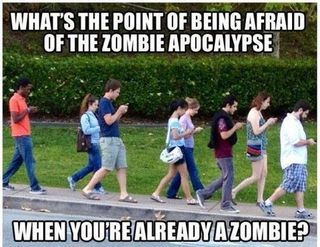Friends
Why "Tech Shaming" Is Wrong and Ableist
Contrary to common perception, technology use supports social connection.
Posted May 17, 2019
One of the best things about freelancing is that I can work whenever I want. I can take Friday off to go hiking with friends (we’ll make plans via text or email, but sometimes through Facebook Messenger) and then catch up on my work on Saturday or Sunday.
Once, while housesitting (one of my side gigs--I’ve found several of my clients through Facebook or Nextdoor), I discovered really lovely little café in Alameda, CA that has a wonderful patio to work in, full of plants and art. But I don’t go there to work because there are signs scattered throughout the café telling me that laptop use on the weekends is prohibited. Why? Because apparently the proprietors have decided they know better than I do what my work hours should be.
It's a perfect example of "tech-shaming": telling others how and when to use their technological devices and, by explicit statement or implication, denigrating their tech-use choices.
It’s popular these days--as, I suppose, it has been any time a new type of technology has become widely used--to talk about how “sad” it is that so many people are on their phone or on social media rather than “really socializing with people”. Those poor souls, so many tut-tut about (ironically, often on social media) who don’t know how to be with real people now that social media and tech allows us to connect online so quickly and easily. What will become of them?? They’re so lonely! They’re so socially inept!! And stupid, to boot--what with focusing on their GPS to the extent that they fall of off piers and cliffs. Those modern idiots, chided by so many. Nobody knows how to have a conversation anymore!! Tech has ruined us!
What if I told you that the opposite is actually true?
I was an extremely shy child (selectively mute, in fact, until 1st grade). This was before the tech revolution of the 90’s; it was the 70’s and 80’s, when the internet and modern computing (aside from military and corporate uses) were in their infancy. I was terrified of answering the phone or talking to anyone outside my family. As I got older, I began to speak, but remained shy and didn’t have great social skills. I was quiet, had problems making eye contact, and had very few friends. As a teen, I never dated, felt extremely ugly, and had pretty much decided I would never have a boyfriend. I met my first boyfriend, Jason, at age 19 (he flirted with me because I was ignoring him while reading my book), and didn’t have another one, Steve, until I was in my mid-20’s.
I met Steve on Yahoo dating. Remember Yahoo dating?
Nowadays, as personal technology options and use have exploded, we see more and more people looking at their phones or devices as they walk, sit with friends at restaurants, take public transportation, and even watch movies. Memes--those seemingly innocent communicators of overly simplistic opinions--use pointed statements such as “I finally realized that people are prisoners of their phones; that’s why they’re called Cell Phones” and, over a photo of schoolkids walking in a group, all peering at their phones: “What’s the point of being afraid of the zombie apocalypse when you’re already a zombie?”

Tech shaming: the newest way for people to feel self-righteous.
Recently, I went on a family vacation. I was with my family for a week, traveling, eating out, laughing, talking. And sometimes, we’d sit on the porch of our rented home, relaxing after a busy day touristing, while some of us--including me--would be on our phones or devices. I read books on my iPad, so I’d either be reading a novel ( I can hear certain types of book people even now disdaining my use of a device to read a book. Yet I've been in the book publishing industry for my entire career--my first adult job was at a bookstore and I never looked back. Devices just make it way more convenient to read books) or scrolling through Facebook. I also managed to do a little bit of client work on my laptop. Yet a tech-shaming stranger looking at us might scornfully think “Look at that sad family, not talking to each other but staring at their devices! Harumph! Nothing but sheep.”
Obviously, tech is no different than any tool or behavior that can be overused, used compulsively, and can negatively affect one’s life if one’s use is out of balance. The same is true of exercise, health-conscious eating, even drinking water. Did you know you could drink too much water? I didn’t until recently. I found out on the internet.
And yes, it’s probably best not to focus on your GPS to the extent that you don’t notice you’re about to drive off a pier, and absolutely let’s turn our cell phones off during performances. That’s just common sense. I suspect people who don’t notice they’re about to drive off a pier (or who are selfish enough to take calls during a movie) have other problems besides an overuse of technology.
And I agree that the security issues with Facebook and other online companies bears paying attention to, as well. I'm a big proponent of true internet security and privacy.
But: the common idea that social media use, internet use, and the use of tech devices isolates us couldn't be more wrong.
It's actually the opposite.
I started to come out of my shell in my 30's, and I have the internet-- specifically Facebook--to thank. The ability to socialize with people online took some of the pressure off of socializing for me. And, since I wasn’t part of many face-to-face social networks (I wasn’t great at making friends back then), Facebook was the way I stayed informed about social events. As I consciously worked on my social skills and confidence, I used Facebook to make friends, connect with people I met at gatherings, and to find out about parties and other social opportunities.
Now, about to turn 49, I’m mostly pretty socially confident (much more than I was 20 years ago), have lots of friends with whom I share face-to-face time frequently, and I still use Facebook to stay up-to-date on my friends’ lives and to make plans with them.
About 2 years ago, I became a full-time freelancer and I’ve seen the focus of my social media use shift. I now use Facebook more for networking, learning and discussing the freelancing journey than I do just scrolling through cat videos or pictures of my friends' meals. I look for clients online, update my professional information on my website and LinkedIn, do research, even take professional development classes on the internet.
And technology can be a lifesaver for people who have physical or mental issues that make face-to-face socializing challenging. Stephanie, a friend of mine who suffers from really debilitating mental and physical issues recently shared--in a comment on Facebook in response to a tech-shaming post--that Facebook and the internet literally save her sanity when she is unable to leave her home due to her illnesses. Other friends use the internet to remain mentally and socially active when suffering from chronic pain or intractable depression, and to socialize, commiserate with, and learn from others who have similar struggles. For these folks, social media helps them stay connected in isolating circumstances, offers hope and support, and makes illness less boring and restrictive.
Are these people “sheep” or “zombies” for being on the internet all day? I’d love to hear you tell that to Stephanie. She’d skillfully carve you up like a Thanksgiving Day turkey.
Another friend lost her husband unexpectedly and uses online groups to connect to other widows, and shares her journey through grief on Facebook. I’ve known her for over a decade, though we’ve never met. We were in an online group together on Tribe.net (remember Tribe.net?), and I’m still friends with several members, some of whom I’ve met in real life and consider friends.
Tech shaming is at its best ignorant and at its worst ableist. Tech-shamers make assumptions about the people they see using their devices without knowing anything about them or their experiences or what they’re doing. Maybe they’re making plans with their mother. Maybe they’re reading their email to see if they got a job offer. Maybe they’re supporting a person who is suffering. Maybe they’re reading the news. Maybe they’re earning money. It’s nobody else’s business, and tech-shamers are just showing themselves to be ignorant and nosy. I don’t tell anyone else how to find out about current events, how to network, or how to entertain themselves, so, tech-shamers, kindly stop telling me and other tech users how to do those things.
In conclusion, I’ll just leave this here:





